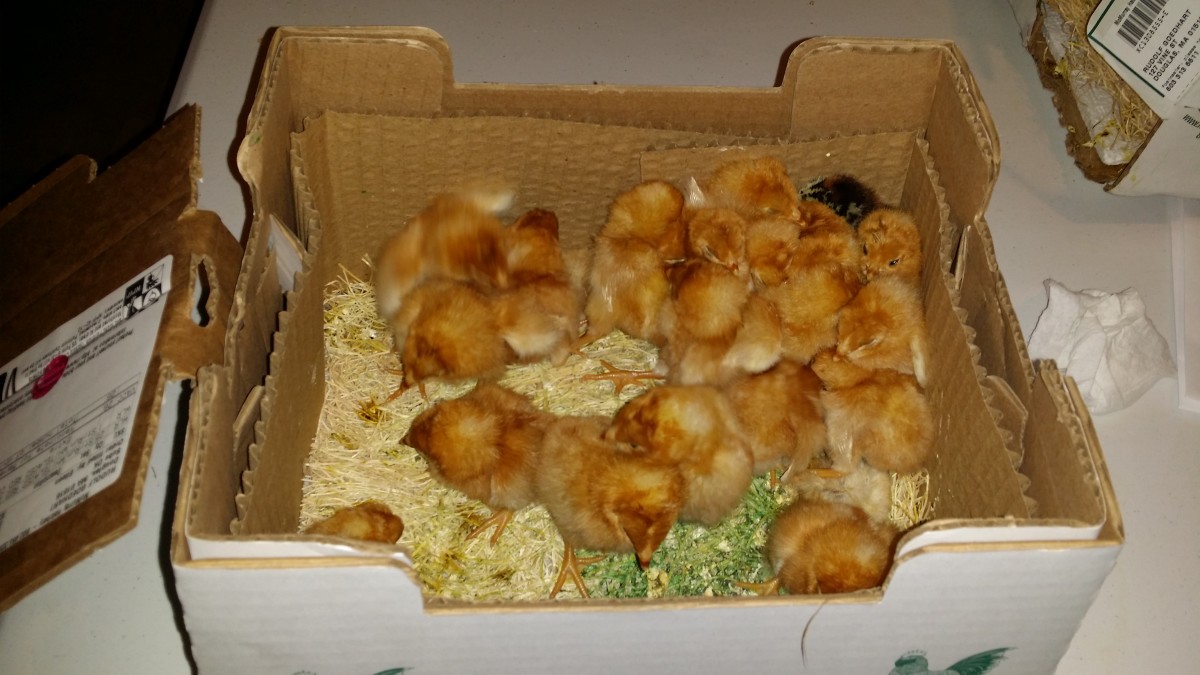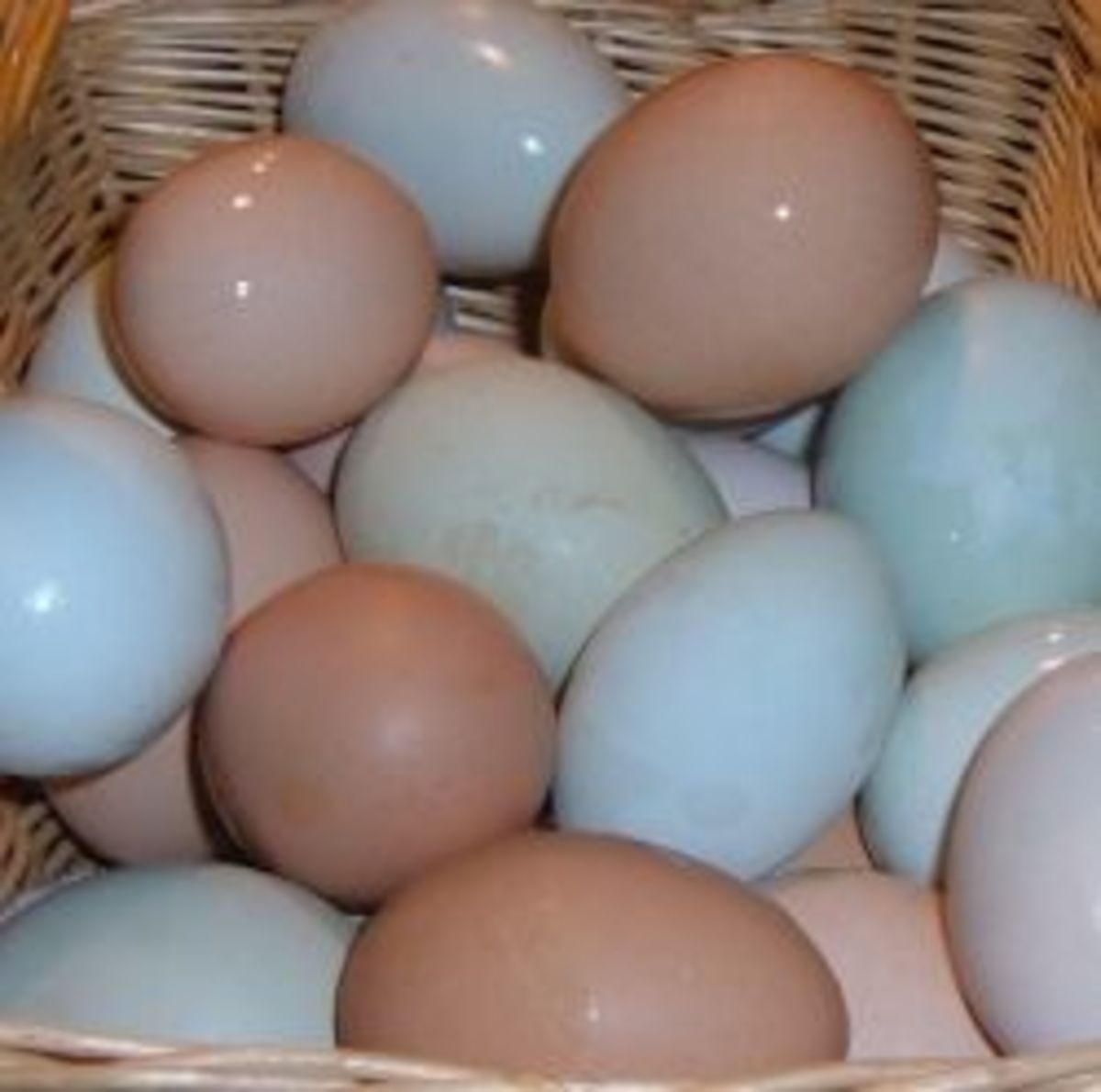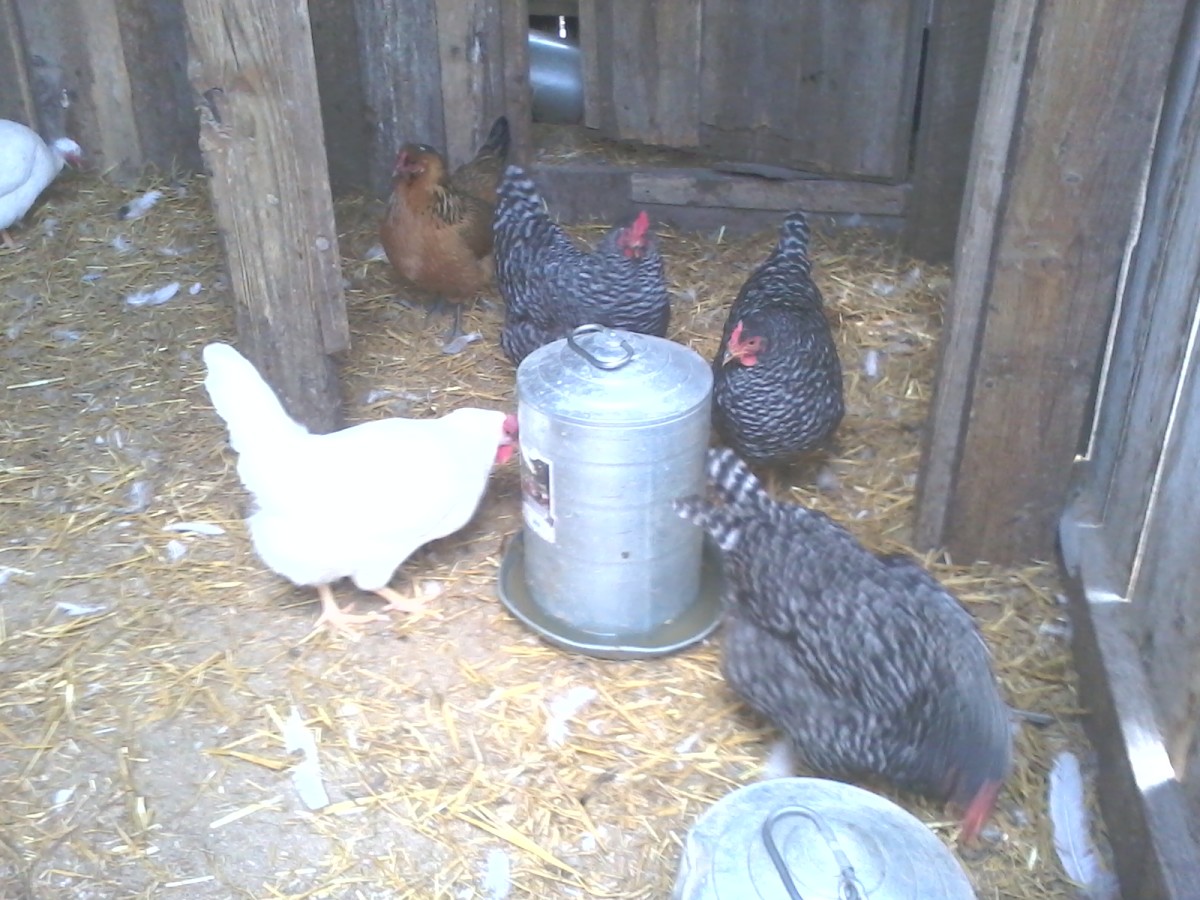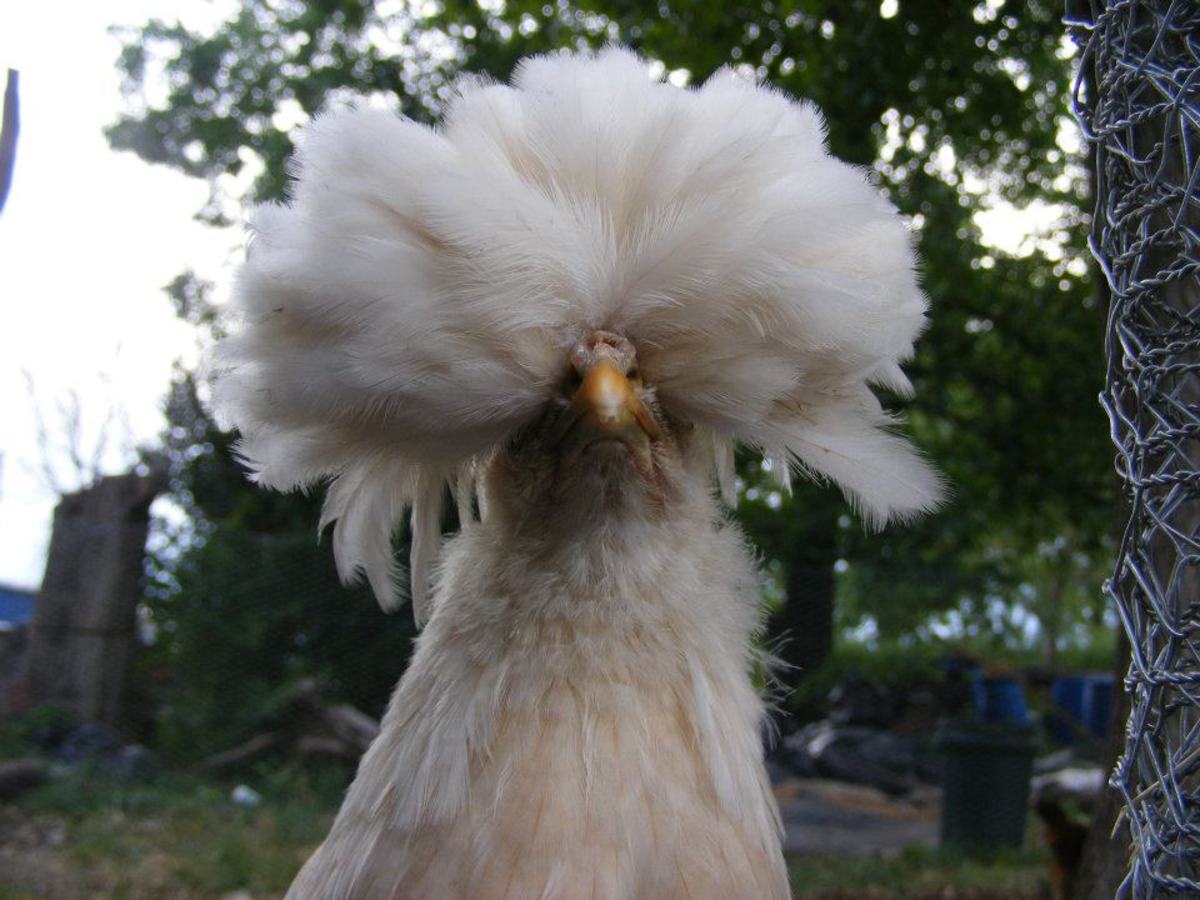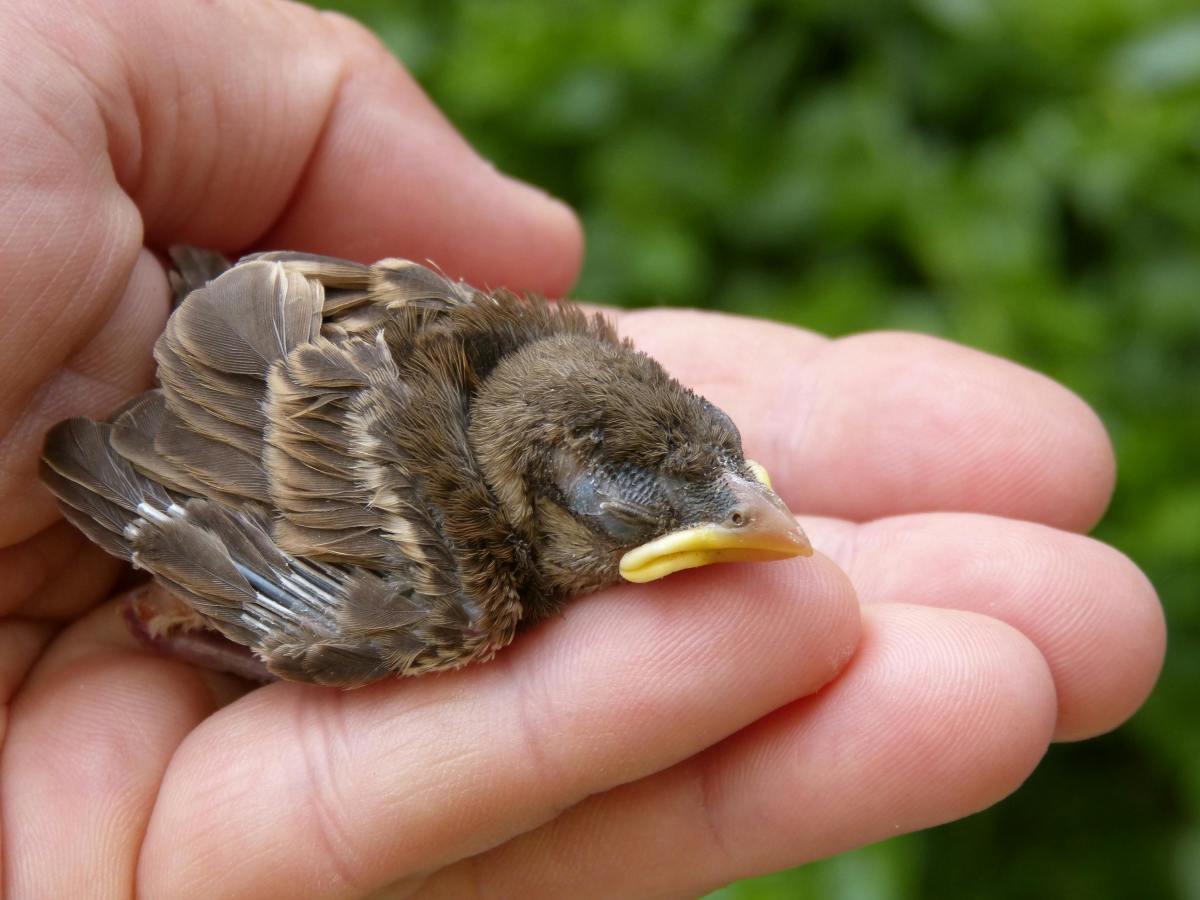Getting Started with Chickens
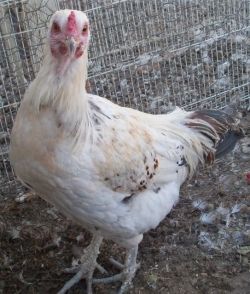
You Should Have Chickens
Chickens make wonderful pets. They provide eggs better than anything you've ever had in the store and they're great recyclers, eating your table scraps and turning them into eggs and rich fertilizer. Not only that, but they're a joy to have around.
Many people who never would have thought about getting chickens before are starting to consider the idea of having a small backyard flock. It's a good decision.
It's amazing how much fun they are to have around, and how enjoyable it is just sitting and watching your flock play. All this, and chickens are readily available. That's right.
Until you start looking around for chickens you may not realize how many people in your area have them or how easy it is to get chickens from stores, the Internet, and numerous other places.
If you've decided to get chickens or are still considering your options, check out this page to see all the information you need to get started.
Table of Contents
Deciding Which Chickens to Get
- Which Size Chickens to Get
- Which Breeds to Get
- Which Sex of Chickens to Get
Where to Keep the Chickens
- Chicken Hutches
- Chicken Tractors
- Small Chicken Coops
- Large Chicken Coops
- Chickens As House Pets
Where to Get the Chickens
- Get Chickens from Neighbors
- Get Chickens from Craigslist
- Get Chickens from the Feed Store
- Get Chicks from Hatcheries
- Get Chickens from Breeders
- Get Eggs from eBay
- Get Chickens from Animal Shelters
- Get Chickens from Livestock Auctions
- Get Chickens from Backyard Chickens and Other Chicken Forums
Which Chickens to Get
Which Chickens Are Right for You?
Before you get chickens, it's important to figure out which chickens are right for you.
Boys or girls, egg layers or meat chickens, small or large, there's a lot to consider when deciding which chickens you should get.
The right chickens will be a good match for you and what you want. The wrong ones will never fit in well, and you may end up getting rid of them completely being they don't fit with what you wanted.
Below are a few things to consider when deciding which chickens are right for you.
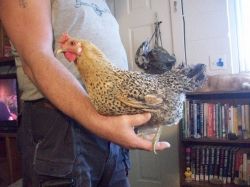
Which Size Chickens To Get?
There are two main sizes of chickens, bantam and standard.
Whether called bantams, banties, or bantys, they are small chickens, ranging in size from tiny to the size of an average-sized rabbit.
Bantams are often less intimidating than larger breeds, and so are good if you are frightened of chickens. Their small size makes many of the bantam breeds more delicate though, and so some bantam breeds are not good for beginners or families where the kids might handle them a lot.
They are small and do require less room, so if you only have a small area for chickens, bantams may be a good choice. If purchasing them as chicks, you won't know which are boys and which are girls, which can be a problem if you can't have roosters.
Standard are large chickens, from the size of an average-sized rabbit to as tall as your knee.
Usually, when most people think of chickens, they think of the normal or standard sized chickens. They're the ones you usually see in movies and in people's yards.
Standard size chickens are nice for general use, having as egg layers or as meat birds. Most standard chickens are calmer than small breeds, but they do require more space and can be intimidating to those unused to chickens.
If you don't want a large standard chicken and you don't want a tiny bantam chicken you may want to look into getting one of the mid-sized breeds. Though there isn't a distinct classification for the mid-sized chickens, they are either small standard chickens or large bantams depending on the breed, medium-sized chickens have lots going for them.
They are large enough to not be really delicate, small enough to not take a lot of room, and hardy enough to do fine even with beginners. Some of the mid-sized breeds, such as the popular White Leghorns are a bit flighty though.
Mixed Flock of Chickens
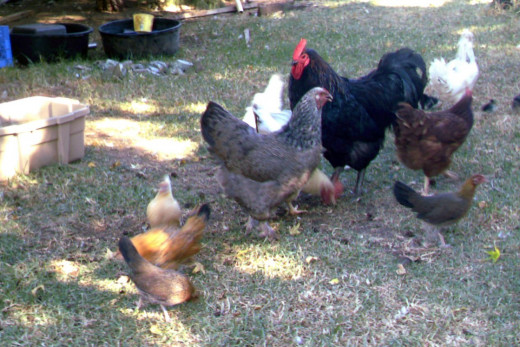
Mixed Size Flock of Chickens
You don't have to get just bantam or just standard sized chickens.
Chickens of different sizes can peaceably coexist, as long as the large breeds are not too aggressive and they all have plenty of space to get away if necessary.
In the picture above, the large black rooster is a standard Black Jersey Giant, the large grey and black hen is a standard Dark Brahma, and the two tiny hens are bantam Old English Games. Old English Games are fairly assertive and Jersey Giants are often very laid-back.
When having a mixed flock, personality and space are the most important considerations, since if they don't have enough space the small chickens can easily get hurt. The chance for having problems makes it a better idea to wait a while until you have more experience before having a mixed size flock, though if you have plenty of space for them to roam and have gentle chickens you should be fine.
Chickens Frolicking in the Yard
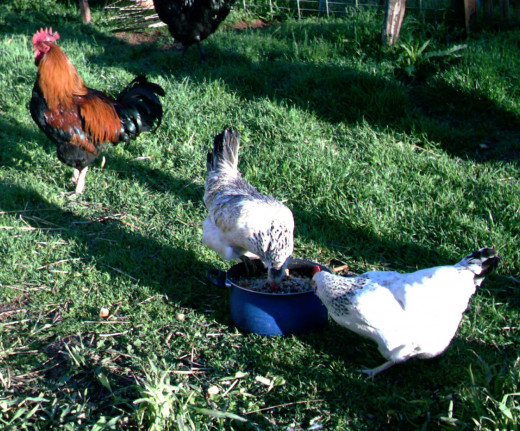
Which Breeds of Chickens To Get?
There are a great many breeds of chickens, some are common, some are rare, but all are wonderful in their own way.
Listed below are some of the common, more easy to get chicken breeds and they are arranged in order of size. This is nowhere near a complete list though and some of these breeds may come in different sizes depending on what country you live in. Also, many breeds come in both a bantam and a standard variety.
Some of the names are links so if you want more information on a particular breed simple click on the name.
Chicken Breed Examples
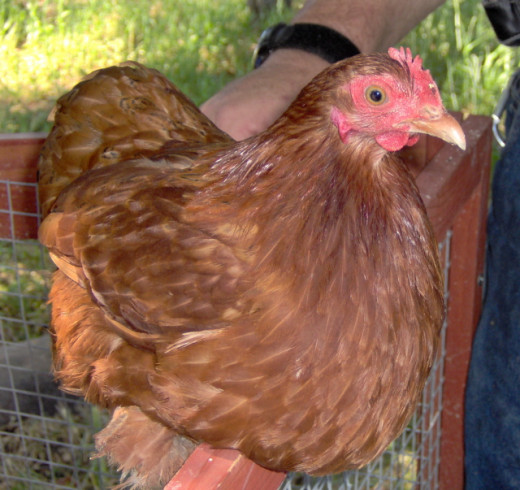

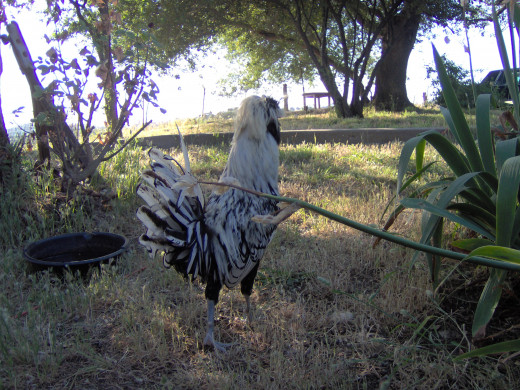
Popular Chicken Breeds
Bantams
Seramas
Sebrights
Old English Games
Japanese
Modern Games
Belgian Bearded D'Uccles
Frizzles
Turkens
Rosecomb
Standards
White Leghorns
Campines
Speckled Sussex
Cornish
Phoenix
Australorps
Delawares
Dominiques
Red Stars / Ideal Reds
Barred Rocks
Rhode Island Reds
New Hampshire Reds
Ameraucanas
Brahmas
Buff Orphingtons
Langshans
Jersey Giants
Which Sex of Chickens to Get?
When looking for chickens to get you need to know whether you want males or females. Obviously, whether to get male or female chickens depends on what you want the chickens for though.
If you want egg-layers, you need to get adult hens or very young females, which are called pullets. You do not need to have males, called roosters, cocks, or if under 1 year of age, cockerels, to have eggs.
Hens and older pullets will lay eggs without a rooster being around, the eggs just won't be fertile. It is handy to have a rooster or two though if you have hens, since they help protect the girls from predators and offer them support. You can also get fertilized eggs from hens housed with roosters, which if you wish, you can allow to hatch and use to replace your flock as they get older.
It is not a problem to have fertile eggs as long as you collect them regularly and keep them in the refrigerator. Some people seem to think fertile eggs are healthier as well, though this is not the case. The small amount of sperm the rooster contributes to each egg has virtually no impact on the healthiness of the eggs.
If you want a rooster, it's best to have one rooster per six to eight hens in order for the girls not to get stressed too much from the rooster and yet still get fertile eggs.
Just a warning, roosters want to protect their flocks, and there are always cases where they decide you, or your children, collecting eggs is a threat. This can lead to the rooster keeping his hens safe by attacking the predator --you!
Depending on the size of the rooster, the condition of his spurs, and whether it is you or your kids, who are lower to the ground, he can cause some real damage. If you plan on having your kids regularly collect eggs, I would suggest that you either keep a close watch or avoid roosters altogether, it's possible for a roo to cause a lot of fear or hurt to your kids very quickly.
If you are going to collect the eggs it is likely you'll be fine. You can always rehome any roosters that don't behave or conscript them to a soup pot.
If you want the chickens for meat, you'll most likely want to get either a mix of males and females (if purchased as chicks, this is called Straight Run and averages about 50% males and 50% females) or mainly males.
Many people, who want both eggs and meat decide to get a batch of straight run chicks. They raise the cockerels for meat and the pullets for eggs. This is often the cheapest way to buy chicks.
Many people get a few roosters just because they're pretty and the people like to watch them and listen to them crow. Some roosters are definitely eye candy and a joy to watch run around the yard.
Beware though, while hens and roosters can both get aggressive, roosters are more likely to do so, and can be dangerous if they consider you a threat to their flock. Also, having too many roosters in too small of an area can lead to them fighting and they can hurt each other.
Where to Keep Your Chickens?
Chicken Housing is Important
Before you get your chickens, you need to set up a home for them. It's important to have the right area for the chickens to live in to avoid health and behavior problems.
There are many options for keeping the chickens, the traditional coop, mini coops, chicken tractors or arks, rabbit hutches, or even as pets in the house.
Then the proper bedding, proper food, and lots of water needs to be supplied in order to keep the chickens healthy.
Hutch with Attached Chicken Run
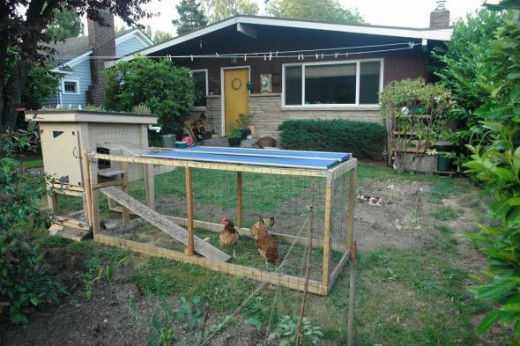
Chicken Hutch with Attached Run
Hutches work really well if you have just a few chickens depending on how big the run is.
There needs to be at least four square feet allotted to each chicken to prevent them from being packed too closely together. Hutches work really well if you don't have a lot of space in your backyard but still want to have chickens or want to separate a pair or trio of chickens for breeding.
My favorite way to use a hutch is to let the chickens free range around the garden during the day and sleep in their hutch at night. That only works if you have an enclosed garden so the chickens don't end up in the neighbor's yard.
Chicken Tractor
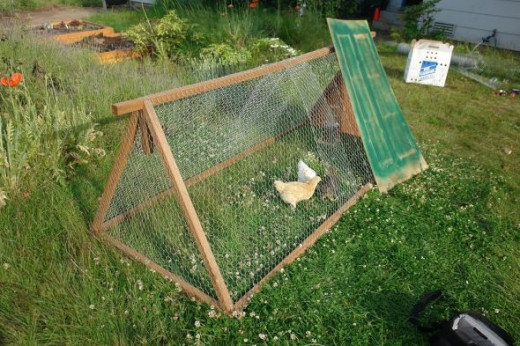
Chicken Tractors, Chicken Arks
Chickens tractors or arks as they are called in certain countries are a wonderful way to keep your chickens contained and protected yet still allow them fresh grass everyday since they are designed to be light enough to easily be moved around the yard.
This easily applies the chicken-butt fertilizer to the grass and gives the chickens more nutrients than living in a bare permanent yard. Too much chicken poop will kill any plants they are around, so by rotating the chicken tractor and not using a regular chicken coop you can spread out the poo and avoid dead spots on the grass.
Some people combine this with a permanent chicken coop and move the chickens into the chicken tractor each morning then back to the coop in the evening, but a well-designed chicken tractor can be used as a permanent chicken home as well.
Learn More About Chicken Tractors
Learn more about chicken tractors with the Chicken Tractor book. It is the best resource for chicken tractor information.
Learn to Build a Chicken Tractor
Learn how to build a chicken tractor with this handy book that gives step-by-step instructions.
Small Chicken Coop
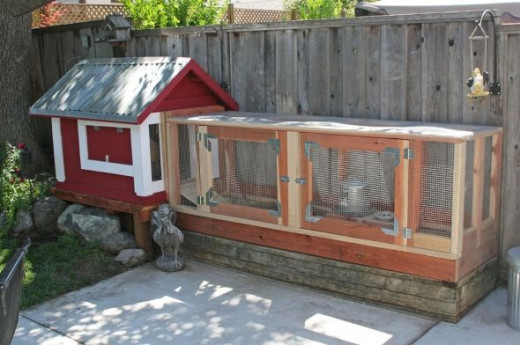
Small Chicken Coops
Smaller chicken coops are a wonderful way to keep chickens in even a small backyard.
They don't take up too much room and can even be made from an old shed or kid's playhouse.
A coop of this size would be an appropriate home for about three to four hens depending on their size and temperaments.
Larger Chicken Coop

Large Chicken Coop
If you plan on getting a large flock of chickens you may want to build a larger chicken coop.
It is always better to build bigger than necessary because chickens are addicting and you will most likely end up with more chickens than you planned on initially.
Also, even if you only have a small flock, it's always best to give them the most amount of space that it is possible to do, since it gives them more area to play around in and helps to prevent behavior problems.
Chicken Coop Book
Make your chicken coop building go smoother by picking up this book with instructions on how to build the chicken coop as well as ideas of things you will want to include in your design. It's always easier to build a good and safe chicken coop if you have help from a good guide.
Keep Chickens as House Pets
- Chickens as House Pets
Chickens, just like parrots and other birds, can be house pets. It's not right for all chickens or all people, but it can be a special chance to bond with a bird that wouldn't do well outside or with a flock or that you just want to stay safe.
Just Buy a Premade Chicken Coop
It is possible to buy a chicken coop already made and if you aren't handy with tools and building, it may be the way to go for you.
Where to Get Chickens?
Chickens Are Available All Over
There are tons of places to get chickens from.
Listed below are just some of the more common, but always keep your eyes out since you may just find the perfect chickens for you in a place you never would have expected.
It can happen, but don't expect to find young egg-laying hens easily available. You will likely need to start with chicks, a few older hens, eggs, or roosters. If you do find good young hens, they will likely be expensive because they are what everyone wants.

Get Chickens from Neighbors
The first place you should check for chickens is your neighbors.
Watch for signs advertising chickens, chicks, or eggs, and also keep your eyes open for chicken coops in people's backyards and poultry roaming around. Poultry that is surviving well for your neighbors and doing well in your climate will be more likely to do well for you.
Many times people who have chickens will occasionally have some they don't want or need anymore, or will be willing to sell chicks or eggs.
Also, becoming friends with other chicken people will give you someone to share your chicken experiences with and a place to possibly run to in an emergency.
So stop by, ask around, and find out if anyone in your area has chickens and if so whether they might be interested in selling some to you or have ideas or where you can get chickens locally.
Get Chickens from Craigslist
When people want to buy or sell something, chickens included, the first place they often check is Craigslist.
If you haven't used Craigslist before, it's a website that is basically one giant classifieds section. It costs nothing to use and each area has their own section. This means that you can look up your area and find people selling and buying items in your area.
The most common section in which to find chickens is the Farm&Garden category, though it is possible to find them under other sections as well.
Many of the chickens posted to Craigslist are mixed breeds, though it is often possible to find purebreds on there when breeders need to get rid of some of their stock. You never know what might end up on there for sale, so check regularly and if you like, post under the wanted section that you are looking for chickens so if someone has any handy they can notify you.
Craigslist Page


Get Chickens from the Feed Store
Many people start by getting their chickens as baby chicks from the feed store.
Most feed stores get regular deliveries of new-born chicks in the spring, and some even have them year-round. This makes the chicks easily available to just about everyone who has a feed store near them.
Baby chicks are tough to care for though, and it takes about 6 months for most breeds to start laying eggs, so consider this before falling in love with the chick's cuteness. Depending on your area's economy and number of feed stores, most baby chicks sell for a few dollars each.
It is very simple to set up a chick brooder and then run to your local store to pick up a few chicks, then drive them home.
If you want specific chicken breeds, consult your feed store. They may be able to let you know when they'll receive those breeds, as well as being able to set some aside when they do get them.
Also, if you ask really nicely, a few feed stores will add your chick choices to their order, since chick hatcheries will not send out small orders of chicks. That is solely their discretion though since a lot of them have had hassles when doing that and people not coming to get their chicks after requesting them. If you do make an agreement with your feed store to have them order chicks for you, please be considerate and get your order when it arrives.
Some feed stores may also have a bulletin board where they allow people to list items for sale, it is often possible to find chickens on there, and the feed store may even know someone who has chickens for sale. In these cases you can even get adult chickens sometimes.
Chicks at the Feedstore
How to Raise Chicks
If you do get chicks from the feed store or anywhere else, please do a bit of research beforehand!
Chicks are very easy to care for --if, and only if--you learn how to care for them.
They have to be kept at certain temperatures, fed certain food, and cared for in certain ways. I see people every year that kill their chicks or have to give them to someone else because they had no clue how to care for them. Do you really want to kill baby chicks or have them make noise non-stop 24/7?
Avert tragedy. Pick up a book or two and learn how to care for chicks before getting them.
Get Chicks from Chick Hatcheries
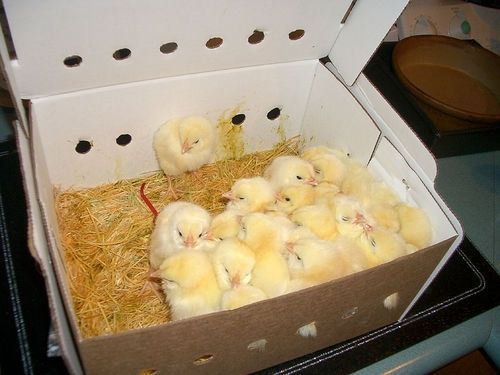
Getting Chicks from Chick Hatcheries
People who want at least 25 chicks or have a few friends to share an order with them have an option open to them, chick hatcheries.
Chick hatcheries are places that raise chickens, then incubate their eggs, and sell the newly hatched chicks to the public.
You can't just go to the hatchery and get the chicks though, instead you order them and the chicks are sent to you through the mail. That is why you have to get at least 25 chicks at a time, having that many chicks together in the specially designed boxes keeps them warm on the long trip.
Before doing anything else, you need to find out if you can receive chicks in your area.
Some areas are so far off the beaten path that the chicks would take a long time to get there, so the post offices won't deal with them. Other areas simply don't have a good airport to receive mail at, or there can be other problems.
Contact your local post office and find out first if you can get live animals there, and if so, how they want them handled. Most post offices will want you to pick up the chicks there, which is a good idea anyway since you don't want the chicks riding around all day in a mail delivery person's truck.
This means that you will need to be able to go to the post office and get the chicks near dawn a couple of days after they are mailed. You will want to have the hatchery put your phone number on the box so that the post office can call you as soon as the chicks arrive. Make sure the phone number is one where they'll definitely be able to get a hold of you. Your post office may also have other suggestions or requirements.
To order the chicks you'll need to figure out which breeds you want and if you'd like females (called pullets), males (called cockerels), or unsexed chicks (called straight run) which are usually about 50/50 males and females.
You'll also need to consider whether you want the baby chicks to be immunized against anything. Different hatcheries offer different immunizations, though some offer only Mareks. Whether to get any immunizations or not is your decision, but many people do not recommend them for small flocks.
They also offer debeaking, which involves cutting off the front of the top beak so that the chickens are less likely to peck each other, a process I don't recommend because it is an extremely cruel and unnecessary to do in a well-managed flock.
Many hatcheries also offer dubbing, a process involving cutting back the comb on some breeds of chickens which is required to exhibit those breeds in shows. Since most hatcheries do not care about breeding to the breed standards, rarely do chicks purchased from them qualify for showing at chicken shows, so dubbing is not really necessary.
After you order the chicks the hatchery will then put some eggs in their incubators and hatch them. They may also have some extras ready to hatch so you may not have to wait for newly set eggs to hatch. This is often the case during the prime spring months whe you are ordering popular breeds.
Since chicken eggs take 21 days to hatch, you can usually get the chicks within 4 weeks, in some cases, you can even get the chicks within a week. The hatchery will box up the chicks in groups of 25 and then place them in the mail. Depending on mail routes and your distance from the hatchery, you should get the chicks within two days. They can do this because baby chicks digest the last bit of egg yolk in their systems for three days after hatching, thus not needing food and water for those days, though we do normally offer it to them when we hatch at home.
Since you'll want a nice warm and comfortable spot for the chicks to go into as soon as they arrive, you'll want to set up a place for them before they arrive (called a brooder). When the chicks arrive, you'll need to hurry into the post office and then quickly return home and place the chicks in the brooder. You'll want to dip each of the chicks' beaks into their water dish as you place them in their cage so they will learn how to drink.
Just a warning, it is not uncommon for some chicks to die in transit. Some mail personnel are not careful, there are cases where the box wasn't on the correct plane or other problems such as an extreme cold front hitting during their shipping, and in some cases, the chicks weren't strong and healthy enough.
Getting chicks this way is not completely fool-proof, but it is the best we have right now. Without being able to ship chicks and chickens, people all over the world wouldn't be able to have them since it is often the only way they can get them. It doesn't happen in every shipment, not even in half, but it is something to prepare for, just in case.
Some major chick hatcheries:
Mt Pet Chicken is the only really different chick hatchery from the lot. Due to special heat pads they add to their boxes, My Pet Chicken can mail smaller amounts of chicks, so they are good if you want less than the normal 25. It costs more, but is worth it if you don't want many chicks. They also say they can tell which sex banty chickens are, so you can order just hens in your chicken order.
Delivery of Chicks from the Hatchery
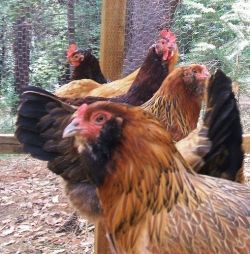
Get Chickens from Breeders
A wonderful way to get chicks and chickens is to get them from breeders.
There are numerous poultry enthusiasts across the country, most specializing in one of two breeds and set on breeding quality poultry.
The best way to figure out what breeder to contact is to decide which breeds you prefer and then find a club that specializes in that breed. Most chicken breeds have at least one breed club, and the popular breeds have may have several.
Find the breed club by doing an Internet search for the breed and the words club or association. If many come up refine the search with the name of your country, area of the country, or state. When you find a breed club in your area check the site for a list of breeders.
Breeders that are part of breed clubs are usually quality breeders, who will have quality birds you would be proud to own. You can also just do a search on the Internet for the specific chicken breed you are looking for. This will most likely bring up a few hobby breeders since many people have webpages devoted to their breeds.
Before contacting any breeders, you should consider what specific chickens you will be interested in.
Do you want the chickens to be only pets or will you want to show chickens--now or in the future?
If there's a chance you will want to ever exhibit chickens, you'll want to get good-quality birds to have as breeding stock. Most breeders place their chickens in three categories: pet-quality or pq, breeder-quality or bq, and show-quality or sq.
Pet-quality means that the chickens being bred are unlikely to meet the standards of appearance required for them to be shown at a chicken show. Obviously, pq chickens will normally be cheaper and easier to find.
Breeder-quality means the chickens have faults that make them unlikely to rate well in a chicken show, but if the chickens are bred in a well-organized way it will most likely be possible to produce offspring that are show-quality. If you want to create a breeding flock of quality chickens, this will be the chickens you will likely need to get.
Show-quality chickens are chickens that are of good-enough quality to be exhibited in chicken shows and may even have been in chicken shows already. It is necessary to be cautious though since some people will claim they have sq chickens when it is not the case.
If you want really good quality birds of that breed it is important to learn details about your chosen breed and know what to look for. Most breeders will not sell their best chicken stock anyway since their breeding plan will most likely need those birds.
Decide what sexes and ages that you are willing to get. Chickens usually hatch 50% males and 50% females, so almost every single breeder has extra roosters (males) to get rid of, sometimes they will send a couple hens to go along with the rooster just to help a new breeder and get rid of a male they don't want to see eaten.
Sometimes breeders will get rid of older hens and roosters when they want to avoid having too many chickens that are too closely related to each other and so want to introduce new breeding stock.
They're also likely to be willing to sell eggs, and possibly even baby chicks. Letting the breeder know that you would be willing to get slightly older birds, extra males, or eggs/chicks may make it more likely that they have something available.
After finding a breeder, you'll need to contact them and find out if they have anything they would like to sell. If they don't have anything available, perhaps they can direct you to someone who does. Many breeders know the other breeders in their area and who has what. So it's possible they don't have anything, but know someone who does.
If the breeder has what you are looking for you'll need to figure out how to get them. Some options are to meet them at their place, at a place halfway between the two of you, have them ship the birds, or meet at a chicken show. Depending on your distance from the breeder and what they are willing to do, this will vary.
Expect to pay a lot for special boxes and shipping charges if you are buying adult birds that need to be mailed to you. Chickens can weigh a lot and need to have special setups to be mailed, all of which costs quite a bit of money. Due to this, many breeders will not ship adult birds.
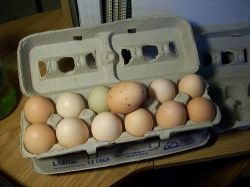
Get Chicken Eggs from eBay
Though it is against the rules to sell live animals on eBay, they do allow the sale of hatching eggs since they are not alive yet, just fertilized.
If you go this route you will either have to have a chicken that likes to set on eggs (a broody) or an incubator. Since broody hens aren't always reliable, often they'll decide they don't want to sit on eggs as soon as you get them, it's usually best to use an incubator. Incubating eggs can be a complicated process, so make sure to learn all you can on the subject before getting the eggs.
A warning before you buy eggs anywhere off the Internet:
Most likely the eggs will have to be mailed to you and due to the nature of the postal service, the eggs may not hatch, and in fact can be ruined in shipping.
I'm not just talking about eggs breaking, most sellers do their utmost to pack the eggs in such a way that only the most careless handler could break them. There is no way to prevent some of the numerous things that can happen to the eggs. They could be exposed to too many x-rays when going through the mail system. If on the plane they aren't kept in the proper pressure (most airplane holds are not pressurized) the cells inside the egg could rupture, causing the chicks to never begin growing. The eggs could be shaken and banged around too much, again causing the delicate cells inside to burst. It can be too hot on the ride and the eggs start to develop, then they are placed where it is cold, which kills any cells that divided. There are tons of things that could happen, and while in-between buyer and seller, there's nothing either can do about it. Most sellers will not give a guarantee on the hatchability of the eggs for this very reason.
In addition, there is no guarantee that the seller is reputable. There are sellers out there that send non-fertilized eggs, bad eggs, eggs from birds that are poor quality, and some sellers that don't take enough care in packing the eggs. It is a case of buyer beware.
On top of all this, incubating is a science. If you are just starting, you may not have much luck when trying to incubate, and even people who have hatched eggs for years don't usually have perfect hatches, even with the best of eggs.
Any of these factors make hatching eggs a risky business, so don't spend more than you are comfortable losing, and don't get your heart set on eggs that may not turn into little chicks. Some people have wonderful results, but it's better not to think that will be you until it happens to you.
On eBay the eggs are usually listed under:
* Business & Industrial >
* Agriculture & Forestry >
* Livestock Supplies >
* Poultry
That is not always the case though . If you do a search for chicken or the breed you want and the words "hatching eggs" you will likely come up with something that will suit you. Out of your choices, try to find reputable breeders that have what you are looking for. Then try to find the person closest to you, since that means the eggs will have to travel less and less travel means the eggs are more likely to do well.
Think about how the weather is between your place and the seller's home. If the eggs might be exposed to really bad weather you'll want to wait until the weather will be good to purchase. Some sellers cannot send to certain zip codes and others won't send out eggs to certain areas until the weather is sure to be good.
Thoroughly read the breeder's ad and ask them any questions before ordering.
Get an Incubator
If you're going to get hatching eggs from eBay or another source, you'll need a way to hatch them. You can use a broody (wanting to hatch eggs) hen or you can get an incubator.

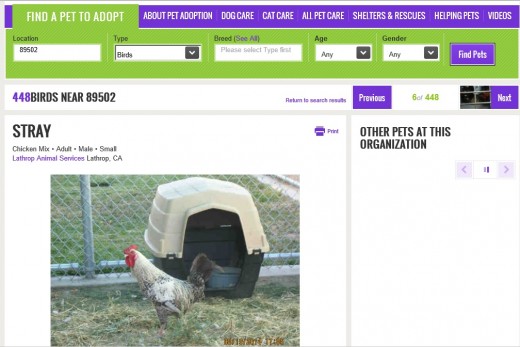
Get Chickens from the Animal Shelter
Sometimes chickens get loose or are turned into the animal shelter. It's always a good idea to check there and possibly rescue a bird or two.
Also, check your area on Petfinder. There are often chickens on there, and there might be some in your area.
Keeping Chickens in the City


Get Chickens from Livestock Auctions
Another place to get chickens is at a livestock auction.
Usually only in farm areas, you may have to travel quite a distance to attend one, though there may be one close to you that you aren't even aware of. Ask at your feedstore, your neighbors, and any old-time livestock people to find out where the nearest auction is to you.
Just a headsup, even if you find an auction, you may not want to attend. At many auctions the chickens are treated horribly because the people who deal with them view them as things, not animals. They can be very harsh places, and since many people are buying the chickens to eat them, they don't care about handling them carefully or about making sure they arrive home alive.
Many people are not raised to treat animals with respect and care, so do not understand why they would behave differently. Not all livestock auctions mistreat the animals though, so use your own discretion on whether you want to attend one or not. I've been to many auctions and some are good and some are bad.
If you do decide to attend a chicken auction, learn more about what you are looking for before you go. Most auctions do not give any details about the birds such as what sex they are, how old, what breed, so you'll need to be able to tell those things yourself. Sometimes there are people attending the auction who might help you learn what to look for, but don't count on it.
It's a good idea to go to a couple of auctions before buying any birds, that way you can get a feel for the bidding and learn what you are supposed to do. Some auctions require you to register and put down a deposit before starting, others are more of a free for all. You'll need cages to transport the birds home and most likely cash, though some auctions do accept credit cards.
It's important to understand that almost none of the birds attending the auction are the cream of the crop. Nice, healthy birds don't usually go to the auctions, they stay home with their owner where they can produce eggs or be breeders. Many birds that end up at the auction are sick, non-layers, roosters, old birds, and others that are not worth keeping anymore. That is not to say that you can't find good birds there, but you can expect them to go quickly and you'll need to know enough to identify them. Try to attend any auctions with people who know about chickens, so you can try to avoid any problem birds.
If you do get birds at the auction, you'll need to practice good bio-security. Since the chickens have all been exposed to each other, they may be sick or about to come down with the germs they caught at the auction.
Do not place the new chickens in your coop as soon as you get home. If they are sick they could contaminate the entire area. Set up a secure area for the chickens to live in for about 2-3 weeks to see if they develop a virus. If you have other chickens already, after the 2-3 weeks are up, you may want to put one of your chickens in with the auction chickens for another couple weeks and see if it catches anything, obviously use a bird you are not too fond of if possible. This way if any of the birds are carriers for anything, the sacrifice bird will catch it, and not your entire flock.
Wear different clothes when dealing with the auction pen so no germs get transferred, and of course feed the auction birds after you do your own flock. This is important to do with all new birds coming into your area, not just auction birds, but the chance of illness rises with birds from an auction, so it's even more important with them.
Get The Illustrated Guide to Chickens

Get Chickens from Backyard Chickens and Other Chicken Forums
A wonderful way to learn more about chickens from other chicken people is to visit one of the numerous chicken forums or groups. This is also a great way to get chickens as well. Most of the members of sites such as backyardchickens.com, Classroom at the Coop, and some of the incredible amount of Yahoo groups such as Chickens101 and The American Silkie Bantam Club are wonderful chicken people who love to help people learn about poultry. You may have to join the forum or group before gaining access to the information, but most of them are free, and all of the ones I've listed on this page cost you nothing to use.
The groups usually allow people to post that they want chickens or want to get rid of chickens on their site as long as they keep it within reason. It's a good idea to look for groups in your area that talk about chickens, and then join them.
Many areas have their own specialized groups and it's nice to have people local to you in case you do end up getting chickens from them you don't have to travel as far. Since they often go hand in hand with chickens or poultry, other groups such as those related to organic living and homesteading often discuss chickens as well so don't discount them. Even of no one has birds available that you are looking for, it's a good idea to learn all you can about them before getting chickens and the groups can help clear up anything you might not know.
Backyard Chickens is the preeminent chicken forum, and if you want or have chickens, it's a great place to visit. It has thousands and thousands of members, and it's very likely that there will be one or two close to you.
Classroom at the Coop is a much smaller site, and often deals with genetics and other complicated aspects of chicken raising, but it is a helpful site too.
Most chicken forums have special sections devoted to the selling of chickens, eggs, and chicks and any posts in other places will be removed, so make sure you read the labels thoroughly before posting anywhere.
When you get to a section that offers birds for sale it's a good idea to read them before posting a wanted ad or contacting anyone listed. It's easy to get carried away and want every bird you see, but be reasonable in what you should start off with, you can always buy more birds later.
Most postings should have their location listed in the title or somewhere inside the post, if you post a wanted, make sure you let the people know where you are as well. It's pretty simple, and best of all, you may make some wonderful chicken loving friends as well.
Learn More About Chickens






